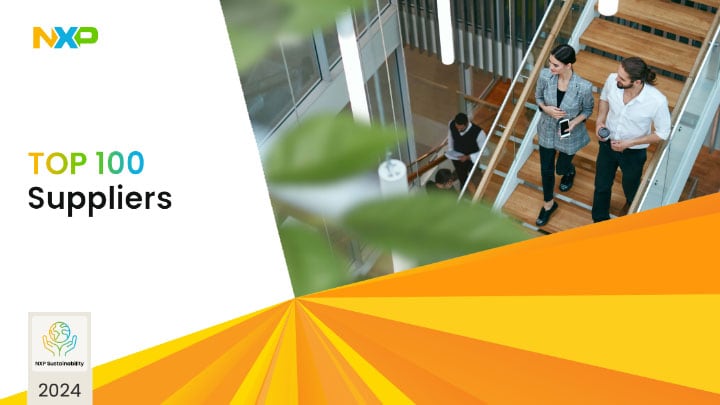Supplier Engagement
NXP is committed to ensuring that working conditions in our supply chain are safe, that workers are treated with respect and dignity and that our products and processes are environmentally responsible.
Supply Chain Management
Audit
We collaborate with suppliers to verify compliance with applicable laws, the NXP Supplier Code of Conduct and NXP Auditable Standards on Social Responsibility.
Commitment to Our Supplier Code of Conduct
We require our suppliers to comply with the NXP Supplier Code of Conduct and the laws of the country or countries where our suppliers conduct business.
Engagement
NXP works collaboratively and consultatively with suppliers to support and enable corrective and preventive action plans for continuous improvement.
Ethics
We confirm that suppliers are recruiting workers and sourcing minerals ethically to meet legal and NXP requirements.
Risk Assessment
NXP engages with advisory firms Verisk Maplecroft and Verité to identify potential risks in our supply chains annually.
Self-Assessment Questionnaire
We ensure high-risk suppliers complete an NXP self-assessment and provide any supporting policies and/or documentation.
Supplier Diversity
NXP values inclusion in all aspects of our operations. We are committed to creating an inclusive supplier community that promotes the participation of small, diverse-owned suppliers as part of our supply chain.
Terms and Conditions
Suppliers are required to adhere to General Terms and Conditions of Purchase of doing business or agreed on valid mutually signed contracts.
Keeping the vulnerable safe
We go beyond standard evaluations supporting workers at all levels. Our risk assessment ensures our teams are not comprised of forced labor.
Audits
Since 2013, when we began our Corporate Social Responsibility and Human Rights Audit Program, we have conducted 242 supplier audits. That includes labor-agent audits as well as verification audits, which began in 2014.
Number of Nonconformances by Rating
Audits conducted in 2024 addressed a selection of high-priority suppliers who had previously been audited to a social-responsibility standard. At all of the five suppliers we had previously audited, we noted a maturity in social responsibility practices and found they had improved on their previous performance.
Nonconformance by Category
Calculating nonconformances using our five categories of standards helps us to identify trends, provide a strategic focus and adjust our engagement plan to continue improving our supply chain. Three categories – Labor and Human Rights, Health and Safety and Management Systems – continue to reoccur in our findings.
Audit Closure Rate
The closure rate for 2024 was 85%. NXP is committed to working with suppliers to reach 100% closure in their corrective actions and this is clearly demonstrated by 100% closure of all audit findings from 2018 to 2022.
Validation
Each year we report publicly on our supplier’s annual top audit nonconformances and each month we report KPIs to the Sustainability Office on topics such as violations and nonconformances from our supplier audits, signed conformance letters, closure rate for corrective action plans and quarter-on-quarter risk indicators within our supply chain. NXP monitors improvement by measuring the number of priority violations, repeat audits, frequency of nonconformances and the nonconformance closure rate.
Reports are reviewed with the Ethics Committee and raised to the Sustainability Management Board in case of significant findings. Monthly and sometimes weekly meetings are held with procurement managers to discuss the results of a supplier audit, the corrective action plan and the supplier's progress toward closing out their nonconformances.
Workplace Grievance Mechanisms
Suppliers are required to have workplace grievance mechanisms in place that ensure the confidentiality, anonymity and protection of whistleblowers who may report any complaints, issues or concerns. The grievance mechanism must be available in the workers' languages. Suppliers must train their workers on the grievance mechanism and communicate the process to them, so workers can raise concerns without fear of retaliation.
NXP acknowledges that we are putting the worker in a vulnerable situation with a private interview, where potential negative impacts, such as retaliation or discrimination could occur. NXP addresses this by providing the NXP grievance mechanism and an agreement with the supplier that retaliation or discrimination will not occur. We monitor and assess compliance and investigate every allegation. These investigations may involve the NXP Ethics Committee. No allegations were received in 2024.
Training
Training focuses on our suppliers and their onsite service providers. The mode of training can be a one-to-one consultation training, a two-hour classroom training or a webinar session conducted by the NXP Social Responsibility Team with support from the site's subject-matter experts. The training is the full requirement of the NXP Supplier Code of Conduct. Supplier training is done:
- Before a supplier’s upcoming NXP Social Responsibility Audit
- During the closure timeline of the supplier’s corrective action plan
- When a supplier requests training
Coaching the supplier on best practices and providing access to the RBA’s e-learning academy are also part of our supplier trainings.
Contact Us
We are here to answer any inquiry regarding our corporate sustainability efforts, including EHS and environmental product compliance.
